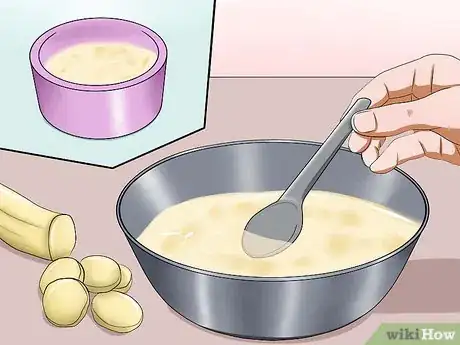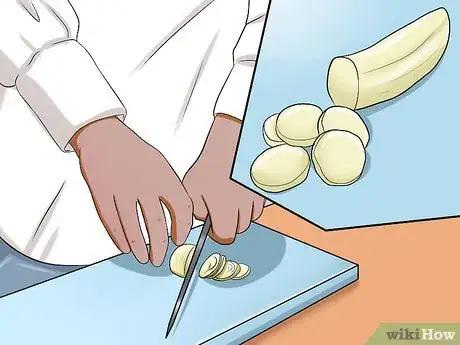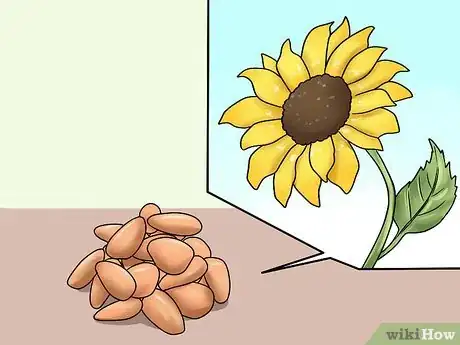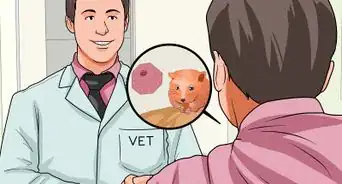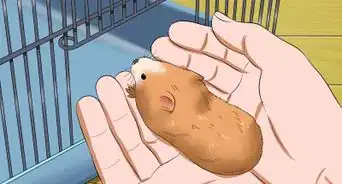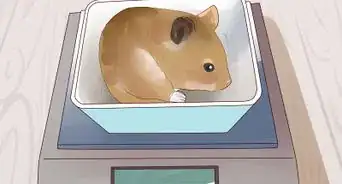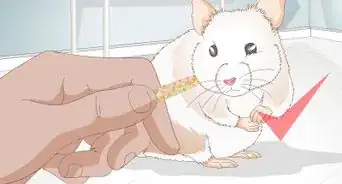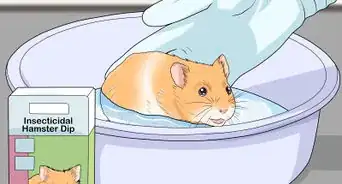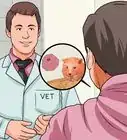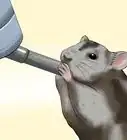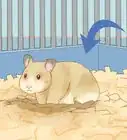This article was co-authored by Pippa Elliott, MRCVS. Dr. Elliott, BVMS, MRCVS is a veterinarian with over 30 years of experience in veterinary surgery and companion animal practice. She graduated from the University of Glasgow in 1987 with a degree in veterinary medicine and surgery. She has worked at the same animal clinic in her hometown for over 20 years.
This article has been viewed 40,637 times.
If you're a conscientious pet owner, you probably want to make sure your hamster has a healthy diet. You can make your own homemade health food for your hamster, using ingredients from the local supermarket. You can also enhance store-bought hamster food with vegetables, fruits, nuts, and grains. Make sure you talk any dietary changes over with your veterinarian to make sure your hamster is getting all the nutrients he needs.
Steps
Making Your Own Food
-
1Create a dry mix for your hamster. Hamsters should eat a dry mix of food made from a variety of fruits, vegetables, and legumes. If you want to make homemade food for your hamster, mix a variety of dried foods together.
- Hamsters, like, humans need carbohydrates, proteins, and fats. These are known as macronutrients and allow the body to function properly. A combination of nuts, seeds, and low starch vegetables are important for a hamster's physical wellbeing.[1]
- Dry hamster food mixes sold at the store typically contain dried maize, peas, dried fruit, beans, barely, and alfalfa sprouts. You can find dried varieties of these foods at a local grocery store and mix them together for your own homemade hamster food. Hamsters generally need 10 to 12 grams a day of their mix, but your hamster may need more or less depending on his size.[2]
- Watch for additives. One of the upsides to store-bought food is that it's specifically made for a hamster. Added ingredients in processed food made for humans can be dangerous to a hamster's health. Go for organic products when feeding your hamster, avoiding foods high in preservatives, saturated fats, salt, and sugar.[3]
- You should always enhance any hamster food you're using, whether store-bought or homemade, with a variety of fresh fruits and veggies. This creates a similar diet to what your hamster would eat in the wild.[4]
-
2Make healthy treats. In addition to healthy food, you should make a variety of healthy treats for your hamster. He'll be happier and more satisfied if he gets a reward on special occasions.
- You can make a fun pudding-like treat with banana, honey, raisins, and lemon juice. Mash up a single banana and add a squirt of lemon juice. Then, add a teaspoon of honey and a teaspoon of raisins. Stir together and serve to your hamster.[5]
- Hamster biscuits can be made with nut spread (like almond butter), cheerios, a variety of finely chopped veggies, fresh bread, sunflower seeds, and a small amount of cheese. Spread a bit of your nut spread on the piece of bread. Stick the cereal and veggies on top. Then, press the cheese around the veggies to create a cover for the food. Place in your hamster's cage.[6]
Advertisement -
3Understand the drawbacks of homemade food. If you want to feed your hamster a homemade diet, talk to your vet first. Most hamsters have store-bought pellets or mixes as the staple of their diet. Such food is fortified with vitamins and minerals necessary to a hamster's health. Discuss your desire to feed your hamster homemade food with your vet before you attempt to do so. You want to make sure your hamster stays healthy without store-bought food.[7]
- If you have your heart set on making your own food, talk to your vet about vitamins and other supplements for your hamster. This way, you can give him homemade food while making sure he's getting all the nutrients necessary for his health.
- You could compromise and give your hamster a mix of store-bought pellets and grains in addition to homemade hamster food and treats.
Adding to Store Bought Food
-
1Add additional fruit and vegetables. A healthy store-bought mix is great for a hamster's wellbeing. However, hamster's need fresh fruits and vegetables in addition to their regular food.
- Non-starchy root vegetables and leafy greens are great for your hamster. Try carrots, squash, broccoli, cauliflower, cucumber, lettuce, and spinach. Always wash any produce before serving it to your hamster.[8]
- In terms of fruit, go for apples, pears, bananas, and berries. Provide your hamster only small servings of fruit. Never give a hamster citrus fruit, like lemons or oranges. They can be toxic to hamsters.[9]
-
2Add seeds and nuts. In addition to fruits and vegetables, hamsters need the healthy fats found in seeds and nuts. Add things like sunflower seeds, cashews, almonds, and mixes of various seeds and nuts to your hamster's diet.[10] Hamsters tend to eat nuts and seeds fast because they're drawn to fattier foods. You may be tempted to give your hamster more sunflower seeds because he seems to like them, but seeds are higher calorie in content. Stick to feeding your hamster nuts in moderation and do not feed him more simply because he finishes a serving.[11]
-
3Consider dietary supplements. If you choose a high-quality hamster food, your hamster should get all the vitamins and nutrients he needs. However, many hamster owners grind up vitamins and mix them into their hamster's food. This might help your hamster have better overall health. If you're concerned about your hamster getting all his necessary nutrients, look for vitamin, mineral, and calcium supplements safe for rodents at your local pet store.[12]
Avoiding Pitfalls
-
1Watch for diarrhea or constipation. If you're feeding your hamster homemade food, you want to keep an eye on his droppings. Hamsters can have sensitive stomachs and certain foods may not sit well with them. If you notice your hamster is experiencing diarrhea, try altering his diet. If you've recently started feeding him a particular type of food, remove that from the mix and see if it helps.
-
2Avoid overfeeding your hamster. When using homemade food, it can be tough to judge how much is enough for your hamster. As stated, most hamsters eat about 10 to 12 grams of a dried food mix a day. Invest in a small scale for your kitchen and try to feed your hamster around that much.
- If your hamster gains or loses weight on a homemade diet, talk to your vet. Your vet can give you advice on how to alter your hamster's diet to make sure he's getting enough food.
-
3Talk to a vet about your hamster's dietary needs. Before starting any new feeding regimen with a hamster, talk to your vet. Hamsters need specific vitamins and nutrients to be healthy. If you're trying to make food yourself, you'll need some professional guidance. You want to make sure your hamster can live a long, full life.
References
- ↑ http://www.hammysworld.com/index.php?p=food
- ↑ http://www.hammysworld.com/index.php?p=food
- ↑ http://www.hammysworld.com/index.php?p=food
- ↑ http://www.pethealthnetwork.com/all-pet-health/small-animal-health-care/top-10-ways-keep-your-hamster-healthy
- ↑ http://www.easy-kids-recipes.com/hamster-food.html
- ↑ http://www.easy-kids-recipes.com/hamster-food.html
- ↑ http://animals.mom.me/hamster-food-housing-needs-1199.html
- ↑ http://www.pethealthnetwork.com/all-pet-health/small-animal-health-care/top-10-ways-keep-your-hamster-healthy
- ↑ http://www.pethealthnetwork.com/all-pet-health/small-animal-health-care/top-10-ways-keep-your-hamster-healthy
About This Article
If you want to make healthy homemade food for your hamster, mix together a variety of dried foods like maize, peas, dried fruit, beans, barley, and alfalfa sprouts. In addition to the dried mix, make sure your hamster is eating plenty of fresh fruits and veggies, as well as seeds and nuts, which have healthy fats that they need. For a healthy, tasty pudding treat to give your hamster on special occasions, mash up some banana with honey, raisins, and lemon juice. When you switch to a homemade diet, be careful to make sure your hamster is getting the added nutrients that store bought foods usually contain. You should consider adding rodent-safe vitamin, mineral, and calcium supplements, which you can find at your local pet store. For more tips from our Veterinary co-author, like how to avoid common pitfalls when feeding your hamster, keep reading!

